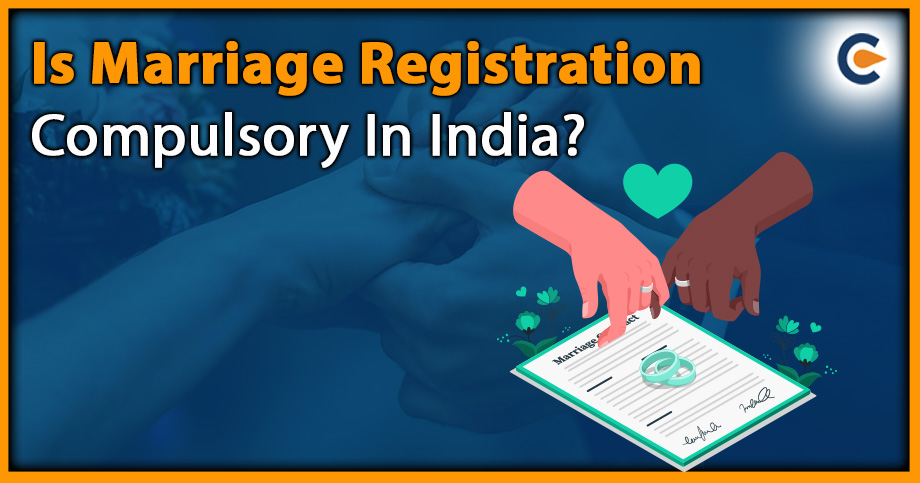Marriage is considered sacred and holy and religious activity in India. As it involves religion, many personal laws have been enacted to decide all the provisions related to marriage. A marriage between people belonging to Hindu, Jain, and Sikh or Buddhist communities is governed by the Hindu Marriage Act. For people not defined in the above-stated Act, the Special Marriage Act has been enacted for the registration of marriage. As per Section 7 of the Hindu Marriage Act, a marriage is considered to be complete when both the bride and the groom take 7 steps around the holy fire together. After the completion of all the religious acts involved in a marriage, the parties should register their marriage.
There are a lot of benefits to marriage registration. After the proper evaluation of the [arties and the submitted documents, the concerned authority provides a marriage certificate to the parties as proof of their legal and valid marriage. For constituting a legal marriage, parties should not marry people from sapinda or prohibited relationships unless there lays a contrary custom existing in their respective community. A marriage registration has proven to be beneficial in various situations and acts as a legal requirement for changing of name, passport, etc.
Many judgments have been laid down by the judicial system of India which have stated the importance of marriage registration. The Hindu Marriage Act lays down provisions with regard to marriage registration under Section 8. Thus, it is advisable for the parties to the marriage to get their marriage registered due to its advantages as the consequences of not registering a marriage are harmful and affect the mental and physical status of a person.
Is It Mandatory To Register Marriage In India?
The Supreme Court in the year 2006 through the case of Seema vs Ashwani Kumar, held that any marriage solemnized between citizens belonging to all religions must get their marriage registered. There is no such mandate under the personal marriage laws. Marriage is still a valid marriage if it is been completed following all the necessary rituals stated in the personal laws. As per Section 8 of the Hindu Marriage Act, 1955 the provisions related to the registration of marriage have been stated. Such provisions under the Act do not put a mandate on the parties to compulsorily get their marriages registered.
Section 8 of the Hindu Marriage Act
Section 8 provides clauses related to the marriage registration. The clauses state that:
- As per the Act, the state government has the authority to make rules for the parties to a marriage for registration of their marriage.
- The Act puts a responsibility on the state government to ensure that the parties are following the rules made by the state government. The section provides provisions with regard to punishment for contravention of the rules. The government can impose a penalty of Rs. 25 on the parties.
- The section lays a duty on the registrar to inspect the marriage of a person who has applied for registration and find out sufficient evidence to prove a marriage to be a valid marriage.
It is mandatory that both parties to the marriage must be present at the time of registration along with witnesses. Therefore, a marriage certificate received after registration of marriage determines the legality and validity of a marriage.
Advantages of Marriage Registration
Following are the advantages of Marriage Registration:
- If any party to marriage works outside India and is willing to take the other party with him/her to such a foreign nation, then a marriage certificate is required to be submitted to the authorities.
- If the marriage is registered, the distribution of inherited property becomes easy.
- During the termination of marriage, a marriage certificate is required to be submitted for deciding the custody of the child or for disposal and distribution of property.
- Embassies need marriage certificates as proof of marriage. They do not accept details of traditional marriage as valid proof.
- Marriage registration is helpful in cases of claiming bank deposits or insurance deposits if such a person dies without stating a name for the nominee.
- If the female wishes to change her middle name after her marriage, a marriage certificate is necessary.
Requirements for Marriage Registration in India
In India, marriages are governed through personal laws and other laws governing inter-caste marriages. These are:
- The Hindu Marriage Act, 1955 for the people belonging to the Hindu religion
- The Special Marriage Act, 1954[1] is for the people willing to register an inter-caste marriage.
In order to complete the registration process, there are certain requirements and documents that the parties need to carry with them for the registration of their marriage. These are:
- The applicants are required to submit the application form to the marriage registrar’s office for registration of their marriage. It should contain the proper names and addresses of both parties.
- Documents such as Aadhar card, voter ID, PAN Card, or electricity bill, etc for proving the residential address and birth certificate or a passport as birth proof must be submitted before the authority.
- As per the prevailing law, there is well-defined age for the parties to get married. The age of the female should be 18 years and a male should be at least 21 years of age to marry. This is the minimum age to make a marriage valid and legal.
- Both parties are required to submit passport-size photographs to the authority.
- The witnesses and guardians of both parties shall be required to be present at the time of the registration.
- If the parties to a marriage are willing to register their marriage under the Special Marriage Act, they are required to submit an ID proving their present residential address.
- In case the parties are willing to register their marriage under the Hindu Marriage Act, a fee of Rs.100 is required to be submitted before the registrar for marriage registration. For parties who want to get their marriage registered under the Special Marriage Act, then the amount of fee to be submitted is Rs. 150.
Marriage Certificate
After the competent authority verifies the authenticity of the application form and the required documents submitted by the parties to a marriage, the authority issues a marriage certificate to the parties. Such certificate is a legal proof of one’s marriage and is useful for several purposes.
Consequences of Not Registering Marriages in India
Even though registration of marriage is not compulsory, the parties must ensure that they get their marriages registered. If parties do not get their marriages registered, they might suffer a lot of losses or disadvantages. Registration of marriage is important as it becomes valid and recognized in the eyes of law. Several issues being faced by the females are:
- Child marriage
- Marital rape against their consent
- Domestic violence and cruelty
- Mental and physical harassment, etc
Conclusion
The Supreme Court has mandated marriage registration. There should be amendments made to the provisions of personal laws for making the registration of marriage compulsory or a new Act should be enacted containing the procedure for compulsory registration of marriages. Marriage should be registered by the citizens who have got married in India for the benefit and the betterment of society. This will also safeguard the interests of the parties to a marriage.
Also Read:
What Is The Process Of Registering Marriage In Delhi Under Hindu Marriage Act?











